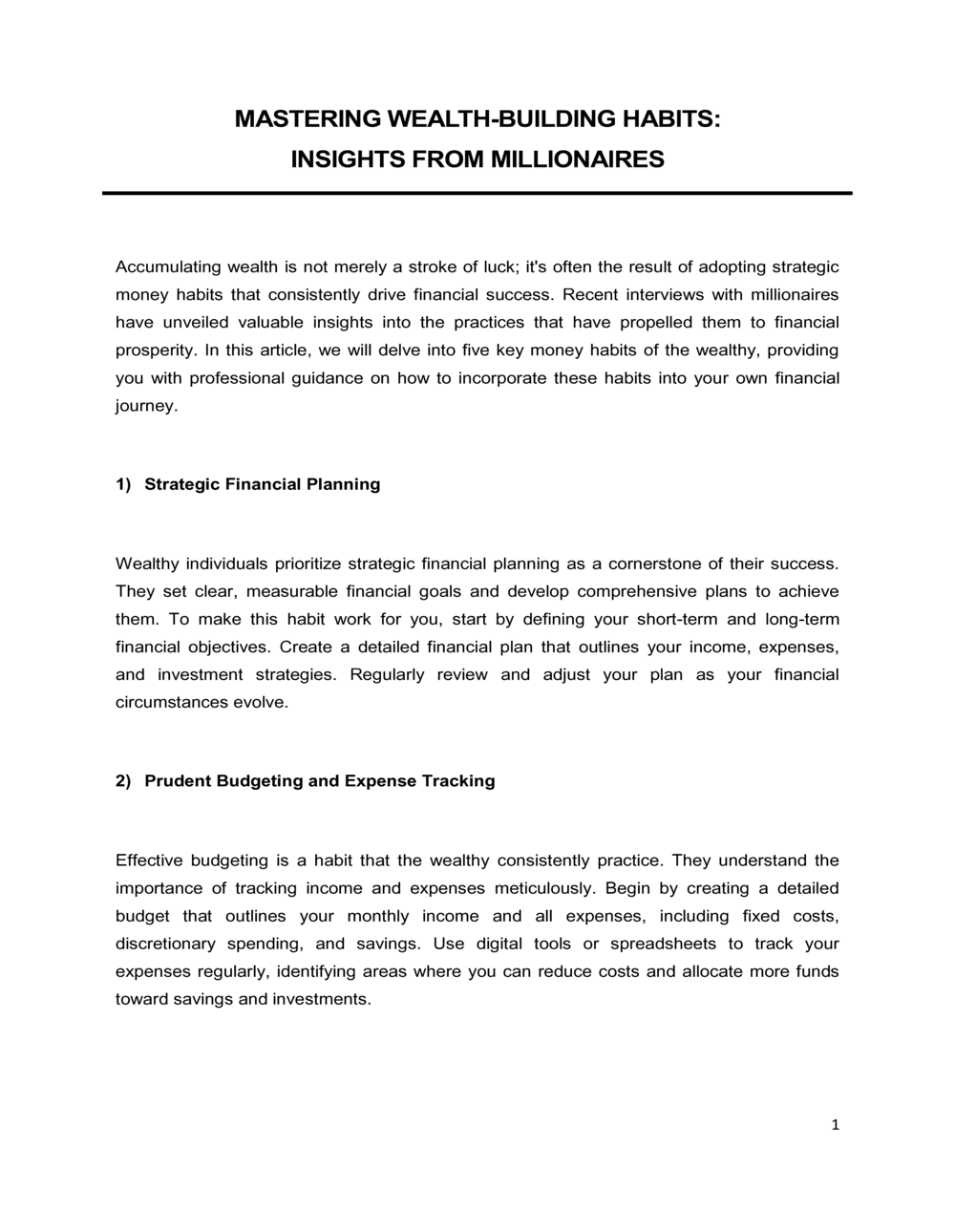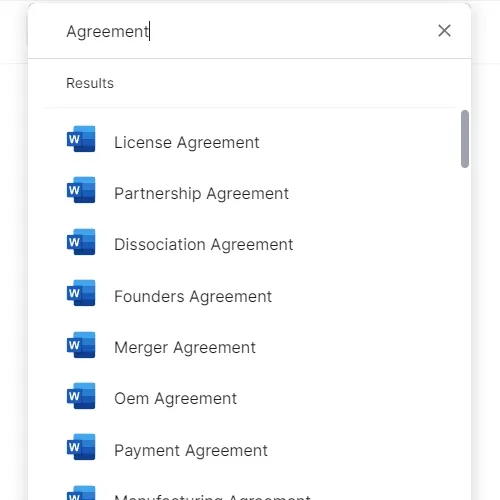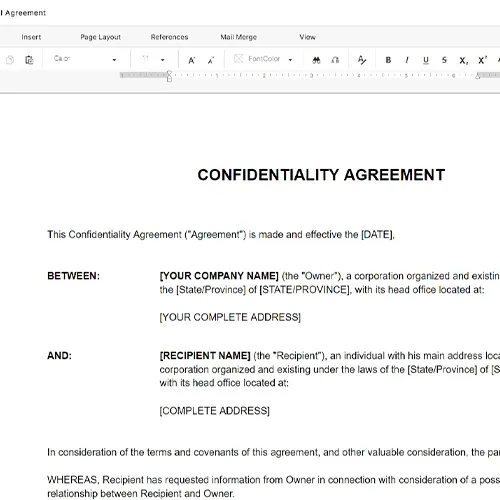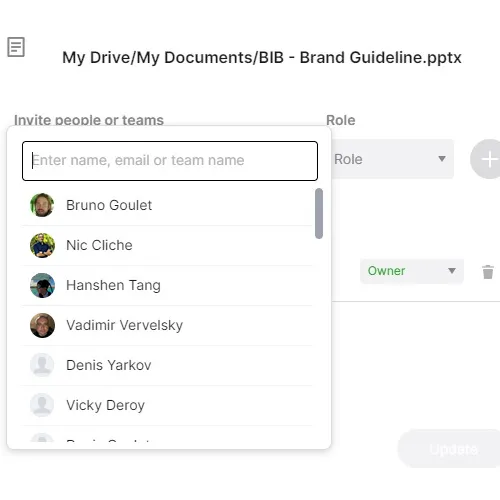Mastering Wealth Building Habits Insights From Millionaires Template

Document content
This mastering wealth building habits insights from millionaires template has 3 pages and is a MS Word file type listed under our sales & marketing documents.
Sample of our mastering wealth building habits insights from millionaires template:
MASTERING WEALTH-BUILDING HABITS: INSIGHTS FROM MILLIONAIRES Accumulating wealth is not merely a stroke of luck; it's often the result of adopting strategic money habits that consistently drive financial success. Recent interviews with millionaires have unveiled valuable insights into the practices that have propelled them to financial prosperity. In this article, we will delve into five key money habits of the wealthy, providing you with professional guidance on how to incorporate these habits into your own financial journey. Strategic Financial Planning Wealthy individuals prioritize strategic financial planning as a cornerstone of their success. They set clear, measurable financial goals and develop comprehensive plans to achieve them. To make this habit work for you, start by defining your short-term and long-term financial objectives. Create a detailed financial plan that outlines your income, expenses, and investment strategies. Regularly review and adjust your plan as your financial circumstances evolve. Prudent Budgeting and Expense Tracking Effective budgeting is a habit that the wealthy consistently practice. They understand the importance of tracking income and expenses meticulously. Begin by creating a detailed budget that outlines your monthly income and all expenses, including fixed costs, discretionary spending, and savings. Use digital tools or spreadsheets to track your expenses regularly, identifying areas where you can reduce costs and allocate more funds toward savings and investments. Strategic Investing Wealthy individuals recognize the power of investing as a wealth-building tool. They diversify their investment portfolios across different asset classes to minimize risk. Start by educating yourself about various investment options, such as stocks, bonds, real estate, and mutual funds. Consider consulting with a financial advisor to develop an investment strategy aligned with your financial goals and risk tolerance. Consistently contribute to your investment accounts to harness the benefits of compounding over time. Debt Management
3,000+ Templates & Tools to Help You Start, Run & Grow Your Business

Document content
This mastering wealth building habits insights from millionaires template has 3 pages and is a MS Word file type listed under our sales & marketing documents.
Sample of our mastering wealth building habits insights from millionaires template:
MASTERING WEALTH-BUILDING HABITS: INSIGHTS FROM MILLIONAIRES Accumulating wealth is not merely a stroke of luck; it's often the result of adopting strategic money habits that consistently drive financial success. Recent interviews with millionaires have unveiled valuable insights into the practices that have propelled them to financial prosperity. In this article, we will delve into five key money habits of the wealthy, providing you with professional guidance on how to incorporate these habits into your own financial journey. Strategic Financial Planning Wealthy individuals prioritize strategic financial planning as a cornerstone of their success. They set clear, measurable financial goals and develop comprehensive plans to achieve them. To make this habit work for you, start by defining your short-term and long-term financial objectives. Create a detailed financial plan that outlines your income, expenses, and investment strategies. Regularly review and adjust your plan as your financial circumstances evolve. Prudent Budgeting and Expense Tracking Effective budgeting is a habit that the wealthy consistently practice. They understand the importance of tracking income and expenses meticulously. Begin by creating a detailed budget that outlines your monthly income and all expenses, including fixed costs, discretionary spending, and savings. Use digital tools or spreadsheets to track your expenses regularly, identifying areas where you can reduce costs and allocate more funds toward savings and investments. Strategic Investing Wealthy individuals recognize the power of investing as a wealth-building tool. They diversify their investment portfolios across different asset classes to minimize risk. Start by educating yourself about various investment options, such as stocks, bonds, real estate, and mutual funds. Consider consulting with a financial advisor to develop an investment strategy aligned with your financial goals and risk tolerance. Consistently contribute to your investment accounts to harness the benefits of compounding over time. Debt Management
Easily Create Any Business Document You Need in Minutes.

Access over 3,000+ business and legal templates for any business task, project or initiative.

Customize your ready-made business document template and save it in the cloud.

Share your files and folders with your team. Create a space of seamless collaboration.
Templates and Tools to Manage Every Aspect of Your Business.
Business in a Box Covers Every Business Department
Includes 16 Types of Business Documents You Need
and Achieve Your Business Goals Faster.
